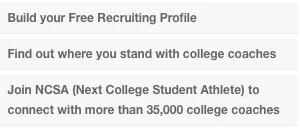To Fight Unions, Conferences Should Adopt Union Demands
In this article for SB Nation by Kevin Tranhan exploring the possibility that Northwestern football players vote against the union, Tranhan notes that the issue has already spread past one university:
However, Huma said he has been contacted by players at other schools who are interested in unionizing, and players at schools like Georgia, Georgia Tech, and Miami have showed support along the way, so it’s going to happen somewhere.
The problem with assessing the impact of the unionization movement is weighing the possible changes employee status and collective bargaining might bring against the relatively modest initial demands of the prospective union:
The group has a sizable list of demands that includes financial coverage for sports-related medical expenses, placing independent concussion experts on the sidelines during games, establishing an educational trust fund to help former players graduate and “due process” before a coach could strip a player of his scholarship for a rules violation.
The organization also wants players to receive “cost of attendance” stipends — most major-conference schools agree — and allow them to be compensated for commercial sponsorships “consistent with evolving NCAA regulations.”
The second part is tougher since the NCAA does not yet allow compensation for commercial sponsorships (or even participation in commercial sponsorships) or athletically related financial aid up to the cost of attendance. Both are potentially targets of the power conferences to change with the autonomy they seek in the new governance structure. They are also elements of possible settlements to the various legal challenges the NCAA is facing.
But everything in the first paragraph is allowed under NCAA rules. There are no restrictions on providing medical expenses for athletes. Changes to concussion management and return-to-play testing and progression are inevitable. Since 2011, institutions can provide financial aid to any former athlete at any time to complete a degree. And the procedure for the cancellation, reduction or nonrenewal of a scholarship is limited only by an institution’s imagination.
These requests are not just allowed under NCAA rules, they are also areas in which power conference institutions might flex their muscle under the new governance structure, just like cost-of-attendance scholarships. Pac–12 commissioner Larry Scott said so in his opinion column in USA Today:
The Pac–12 Conference, of which I have been commissioner since 2009, along with other conferences around the country, have been pressing for NCAA reform that would reflect the evolving needs of student-athletes, allowing for increased academic support, improved student-athlete health care, and enhanced athletic scholarships up to the full cost of attendance. I am confident reform is coming within the NCAA in the next few months, and soon universities will be allowed to provide this additional support for student-athletes.
The response to the NLRB decision from Scott and other leaders in college athletics has been that reform is necessary, inevitable, and on the horizon, but unions are the wrong way to go about it. All student-athletes have to do is wait, just a few of months according to Scott.
One problem: the leaders of collegiate athletics are running out of time. The NCAA and college athletics will not and maybe cannot fix themselves overnight or all at once. It will be a process of first not getting any worse, then getting better over time. But to have the time to do that, the NCAA and its members need to earn back a sliver of trust that they will follow through.
To do that, they should not wait months or weeks. Larry Scott could get the athletic directors and presidents of the Pac–12 on the phone tomorrow and have them vote to guarantee everything the union is asking for that is allowed under NCAA rules. The conference could make it a requirement that institutions provide these benefits and assurances. They could even agree to provide cost-of-attendance scholarships and outside income opportunities as soon as the NCAA allows them.
The most effective argument against unions is to demonstrate they are unnecessary by providing the protections and improvements a union would fight for without the fight. At the moment, institutions and conferences acting on their own can one-up the union by extending these guarantees to all athletes, including walk-ons and sports other than football. That hurts union organizers by removing some of the benefits to joining a union and forcing them to expand their demands, which will draw additional political and public opposition.
Once one major conference does this, the others will be under significant pressure to follow. A conference that does not preemptively make these guarantees would become the focus of both union organization efforts and public criticism. Even mid-major institutions and conferences would be forced to fall in line if they want to continue trying to keep up with the Joneses and avoid a union on their campus with much less wiggle room in their budget. This also reduces the competitive impact of being one of the first to adopt these policies.
Reform has been promised for two and a half years now, with few new guarantees to student-athletes to show for it. There are few people left sympathetic to an argument that the existing systems are the best avenue for change and that all that is needed is more patience. Patience has run out and words are no longer effective. The only way to make this case now is action and that action has to be taken as soon as possible.


